Things to consider when buying a property
by Sarah Coombs
There are, of course, many things to consider before buying a house. Today I want to focus on the legal issues. This isn’t about whether the house suits your needs or if it’s in a good location; it’s about the legal aspects of purchasing property.
First thing to consider is how you’re going to pay for the property.
There are many ways to pay for a property. You could have the cash upfront, or borrow money from a bank. If you borrow money from a bank, make sure you have a subject-to-finance clause or preapproval organized before signing the contract of sale. Without these organized, you could end up in a difficult situation where you can’t pay for your property and become in default of a contract of sale with all its nasty ramifications.
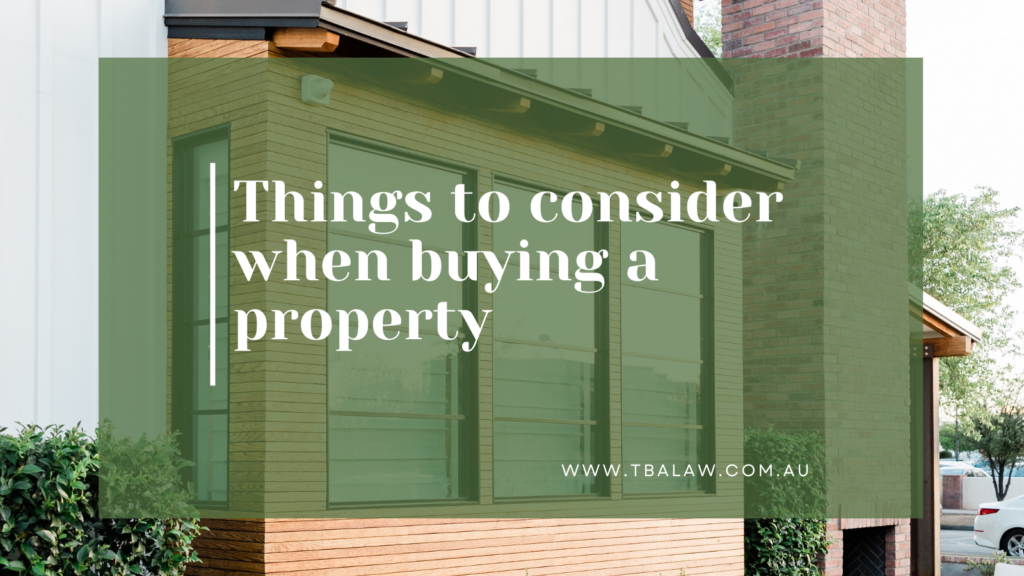
So we always recommend before signing a contract you know exactly how you’re going to be paying for that property, whether it be clear funds or whether it be borrowing. It’s always good to make a number of inquiries with brokers or banks to make sure you understand where you sit financially. It’s not good enough just to have had the nod from your banker. You really need to know that you’re definitely able to get that finance, and that is why so many people make their contract subject to finance. Being subject to finance basically means that if you don’t get your finance formally approved in that time window, normally about 14 days, you have the right to exit from the contract without penalty and you get your deposit back. This is a very good safeguard and prevents you from losing potentially tens of thousands, hundreds of thousands of dollars when you’re unable to settle on a contract.
Yes, how you will pay for the property is a major consideration. In my experience, most people purchase properties with bank finance. It’s easier if you don’t involve another third party, but it’s common to do so. We work with banks frequently and they can take longer than you expect to get your finance approved. So if they say they’ll be seven days, estimate for 14 days. This provides you with a little bit more coverage if needed.
The second thing to consider is how you want to use the property.
Properties are zoned for different purposes. For example, they might be zoned residential, or agricultural, or rural living. Depending on what you want to do with the land, zoning will be relevant. You can’t just buy a property in a residential zone and knock it down to build a shopping center–council won’t allow it. So when you’re buying a property, you need to be conscious of what your future use of that property is going to be and if it suits the zoning (what’s already on the land) plus any covenants or restrictions on the property. It can be incredibly tricky to change zoning–it’s an expensive undertaking!
For example, if you’re buying a house to live in, but you’re a hairdresser who plans to work from home, make sure you check with the council that it’s legal for you to operate your business from your bedroom or whatever room you use.
If you plan to knock down a building and build something else, or convert a house into a doctors surgery or dental surgery, it’s important that you research and think about future uses for the property.
The third point to consider is how long will it take for the contract of sale to be settled.
As a general rule, contracts of sale tend to settle after 30 days, 60 days, 90 days. The date can be as short or as long as you want, provided you and the vendor agree. If there is no bank involved, we can settle in a relatively quick amount of time; maybe 21 days. But if there is a bank involved or whatever like that, we would say a minimum of 30 days. How long you want to settle is also relevant to whether there are tenants in the property. If there are tenants in the property, you might need to wait for them to move out; wait for the vendor to move out.
If you are in a rental and need to extend the lease or if your property has been sold and you need to vacate in a certain amount of time, it is important to know how long settlement will take so that you can make arrangements for where you will live.
The fourth thing you should consider is fees and sale with vacant possession.
If you want to move into a property and buy it from someone, you will need vacant possession at settlement or very shortly afterwards. This means that there are no other people living in the property when you buy it. If there are tenants living in a property before you buy it, then they might not be able to move out straight away because they have a lease agreement with the landlord of that property. If this happens, then it might take 60 days or more for them to move out. So if you do want vacant possession straight away and want to move into a property quickly after buying it, make sure you ask about this before you sign any contracts or agreements.
Fifth thing to consider, you should be aware of any covenants, design guidelines or restrictions on the property you’re looking to buy.
This information is contained in section 32 of the vendor statement, which you should read with your solicitor before signing a contract. Covenants might include restrictions on how you can develop the house or garden; for example, you may need to build with brick rather than wood or green fences rather than red ones.
There are many things to consider when looking at covenants and design guidelines. It might be that they need to suit a certain style, or they might limit what type of housing can be built on the property. We review these documents for you before you sign anything, but it’s important that you look at them yourself as well so that you understand what you’re signing up for. Restrictions can also include easements; if there’s something built across an easement (like an illegal structure), it could be a huge problem because the owner could have to tear down that structure in order to comply with the covenant.
Finally, I just wanted to touch briefly on buying off the plan.
It’s quite common for people to buy properties off the plan. This is when it’s not subdivided yet. So you only want to buy a little bit of land that’s still in one large piece and your property is buying off the plan. With these contracts, it’s important to be aware of your rights and the vendor’s rights in terms of ending the contract because subdividing land can be quite a lengthy and paperwork-heavy process. It can often take months or years and could take a very long time. Under these contracts it could be that you expect the property to be subdivided within six months but actually there is no way out if the vendor doesn’t register within seven years!
If you want to buy a piece of land and build a house as soon as possible, that may not be possible. We often have people waiting years after signing up for a contract of sale to make sure that they can then get settled and get into their property. So it’s important to understand any covenants and guidelines associated with that off the plan property. It’s also important to understand that an owners corporation is attached to the property, so consider that if you’re looking at a property, see if it has an owners corporation attached and any additional fees or charges associated with it.
And lastly, when buying a property, you should consider the outgoings associated with it.
Property rates are one common expense that many property owners pay, ranging from $1,000 to $5,000 per year on residential blocks. You should also consider water rates and state land tax when buying property, as well as other fees related to owning your own home.
We recommend that you have a solicitor review all the documents before you sign the contract of sale. We review them as part of our standard fee here at TBA Law. You can contact us on 1300 043 103 or email us at admin@tbalaw.com.au.
We’re happy to have a chat with you, and we’ll review documents as needed to help you buy your dream home or property.


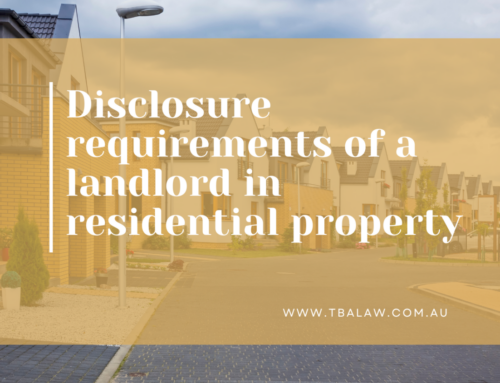
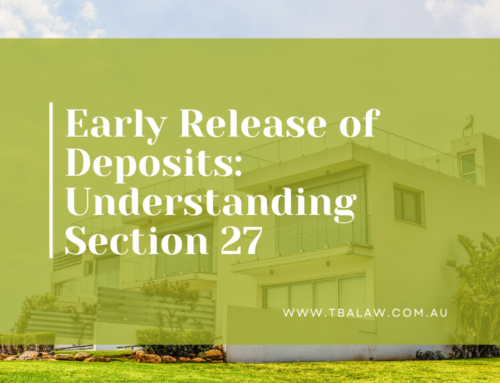
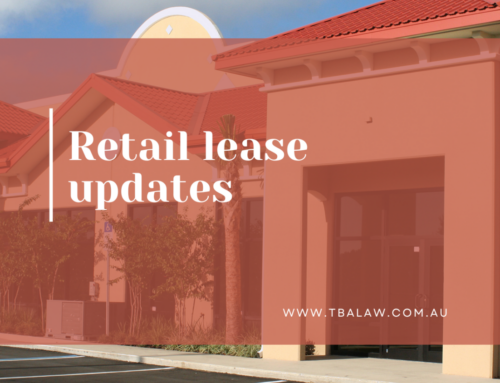
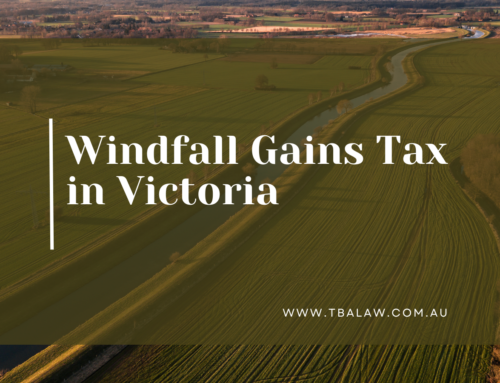
Leave A Comment